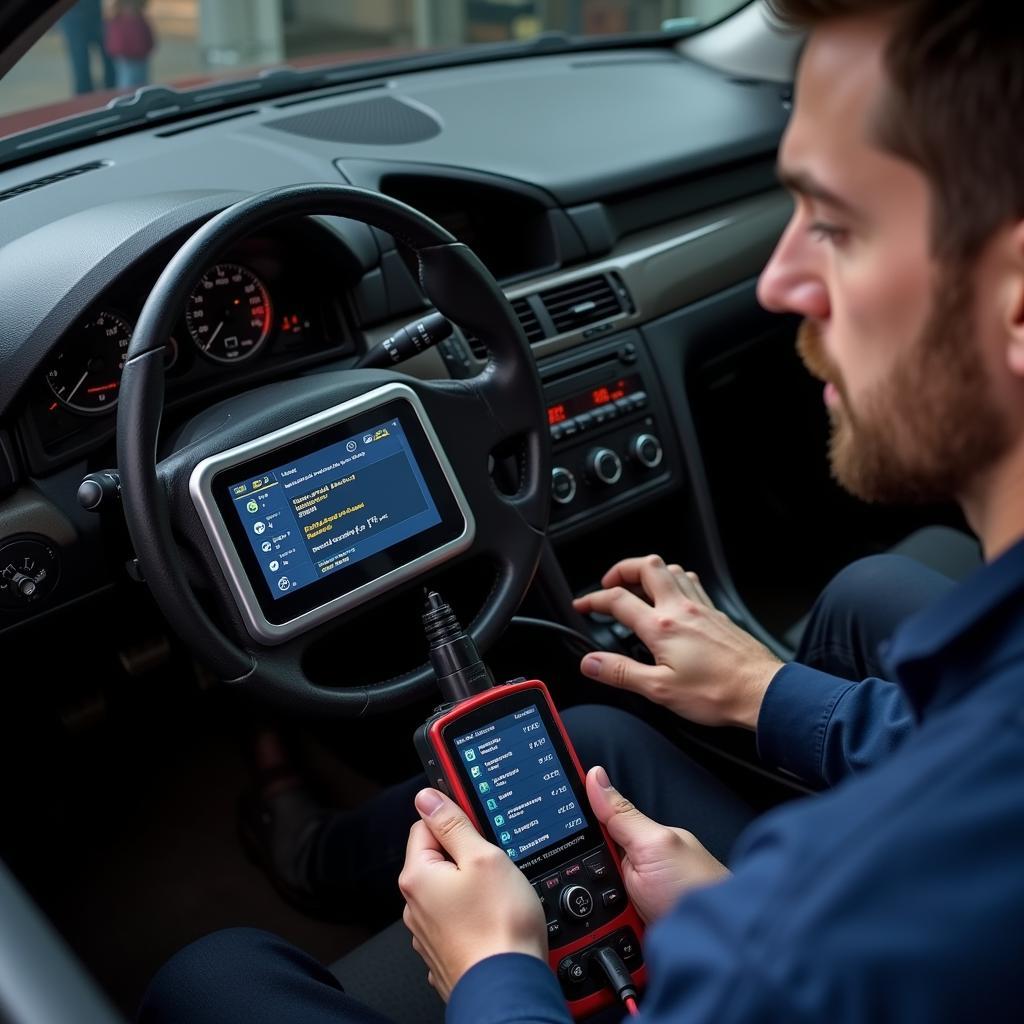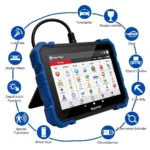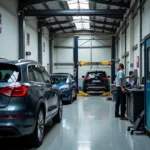Running diagnostics on your car is crucial for maintaining its health, identifying potential issues early, and saving money on costly repairs down the line. Whether you’re experiencing a noticeable problem or simply want to ensure everything is running smoothly, understanding how to perform diagnostics can empower you as a car owner. This guide will provide you with a comprehensive overview of car diagnostics, from understanding the basics to utilizing advanced tools and techniques.
Do you suspect a problem with your car’s engine or transmission? Perhaps the check engine light has illuminated, leaving you wondering what’s wrong. Learning to run diagnostics on your car can help pinpoint the source of these issues. Diagnostics can reveal a range of problems, from minor sensor malfunctions to more serious mechanical failures. This guide will delve into the various methods and tools available for running diagnostics on your car, empowering you to take control of your vehicle’s maintenance. Even seemingly simple tasks, like checking your tire pressure, can be considered a form of diagnostic check. We’ll explore all of these and more. You can find specialized diagnostic services at car diagnostic in kempton park.
Understanding the Importance of Car Diagnostics
Regular diagnostics are essential for preventative maintenance and identifying potential problems before they escalate into major repairs. This proactive approach can save you time, money, and frustration in the long run. Early detection can prevent further damage and keep your car running efficiently.
Why Run Diagnostics?
- Identify Hidden Problems: Diagnostics can uncover issues that aren’t immediately apparent, such as failing sensors or developing electrical problems.
- Save Money: By catching problems early, you can often avoid more expensive repairs down the line.
- Improve Performance: Addressing diagnostic trouble codes can improve fuel efficiency, engine performance, and overall drivability.
- Extend Vehicle Lifespan: Regular maintenance and timely repairs, guided by diagnostics, can significantly extend the life of your vehicle.
Methods for Running Diagnostics on Your Car
There are several ways to run diagnostics on your car, ranging from simple visual inspections to using advanced diagnostic tools.
Visual Inspection
A visual inspection is often the first step in diagnosing a car problem. This involves checking for obvious signs of damage, leaks, or wear and tear.
OBD-II Scanner
The On-Board Diagnostics (OBD-II) scanner is a powerful tool that connects to your car’s computer system and retrieves diagnostic trouble codes (DTCs). These codes provide valuable insights into the specific systems or components experiencing issues. If you’re looking to purchase a car, ensure you perform diagnostics. Check out diagnostics for cars for sale.
Professional Diagnostic Services
For more complex issues or if you lack the tools or expertise, professional diagnostic services are recommended. Mechanics have access to advanced equipment and in-depth knowledge to accurately diagnose and repair your vehicle. You may find specific tools, like the vw car diagnostic tool, useful for particular makes and models.
Mobile Diagnostic Apps
Mobile apps paired with Bluetooth OBD-II adapters provide a convenient way to run diagnostics on your smartphone or tablet. These apps offer features like real-time data monitoring, code reading, and even repair guides. Check out apps like the take a lot car diagnostic app.
Interpreting Diagnostic Trouble Codes (DTCs)
Understanding DTCs is essential for effectively using an OBD-II scanner. Each code corresponds to a specific problem or malfunction within a particular system. Resources like online DTC databases can help you decipher these codes and understand their meaning.
When to Run Diagnostics on Your Car
Running diagnostics is recommended in the following situations:
- Check Engine Light On: This is the most obvious indicator that something needs attention.
- Unusual Noises or Vibrations: These can be signs of developing mechanical problems.
- Decreased Performance: If your car feels sluggish, has reduced fuel efficiency, or experiences other performance issues, diagnostics can help identify the cause.
- Before Buying a Used Car: Running diagnostics can reveal potential problems and help you make an informed purchase decision. You might want to explore specific engine diagnostics, like n20kx car diagnostic, if you’re focusing on a particular model.
Conclusion
Running diagnostics on your car is an essential part of responsible vehicle ownership. By understanding the various methods and tools available, you can proactively identify and address potential problems, saving money and extending the life of your car. Whether you use a simple visual inspection, an OBD-II scanner, or seek professional help, regular diagnostics are key to keeping your car running smoothly.
FAQs
- What is an OBD-II port? The OBD-II port is a standardized connector found in most cars manufactured after 1996. It allows access to the vehicle’s computer system for diagnostics.
- How often should I run diagnostics on my car? It’s recommended to run diagnostics at least once a year or whenever you experience unusual symptoms.
- Can I fix my car based solely on diagnostic trouble codes? While DTCs provide valuable clues, they don’t always pinpoint the exact cause of a problem. Further investigation may be necessary.
- Are all OBD-II scanners the same? No, OBD-II scanners vary in features and capabilities. Some offer basic code reading, while others provide advanced functionalities like live data streaming and graphing.
- What should I do if I can’t understand a diagnostic trouble code? Consult a professional mechanic or refer to online resources for assistance.
- Do mobile diagnostic apps work as well as dedicated scanners? Mobile apps can be effective for basic diagnostics, but dedicated scanners often offer more features and reliability.
- Can I damage my car by running diagnostics? No, running diagnostics using a properly functioning OBD-II scanner or app will not harm your vehicle.
Need help with car diagnostics? Contact us via WhatsApp: +1(641)206-8880, or Email: [email protected]. Our team is available 24/7 to assist you.



